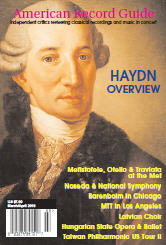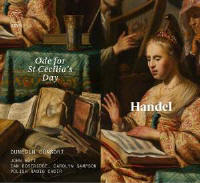Texte paru dans: / Appeared in: |
|
|
Outil de traduction ~ (Très approximatif) |
|
|
Reviewer: John
W. Baker Butt continues to lead his Dunedin Consort through important literature, mostly (if not entirely) Baroque. A novel touch is that this latest recording was made, not back in Scotland, but in Cracow, Poland, with a Polish choir.
Handel’s compositions in praise of St Cecilia were efforts to revive the London celebrations of the patron saint of music that went back to the age of Purcell, some four decades earlier. In 1739 Handel even went back to John Dryden’s poem of that vintage, a Song for St Cecilia’s Day (since called Ode). Such steps linked him with British tradition at the time he had committed himself firmly to his new idiom of English oratorio. Moreover, as Purcell had done in his Cecilian tributes, Handel used the imagery that Dryden employed in his text as opportunities to reflect enthusiastically on his thoughts and ideals about music itself.
Recordings have been kind to this composition. By my reckoning, this is the 13th release of the work, and many are graced by superlative soloists. Five originated in LP days, using modern instruments. The one led by Ledger (ASV) is still treasurable. Of the later 7 recordings, at least 3 stand out: Trevor Pinnock (Archiv), Robert King (Hyperion), and Richard Neville Towle (Delphian: M/J 2013).
This newest recording has mixed qualities. For period-instrument style, Butt’s players are of front rank. Both the soloists make their second appearances in the work on records: Partridge was in the 1967 recording under David Willcocks for London. After all these years, here he is again, still lean-voiced and stylishly clear. Sampson appeared in King’s recording: once more, she sings gorgeously, but she does not work hard enough to overcome the problem of words getting through a soprano’s higher register, resulting in very unclear diction. The chorus, too, has diction problems; they sing admirably and cope pretty well for Poles not born to English, but there is nevertheless a somewhat blurred character in their dealing with the language.
Then there is the question of adding more music beyond this one work. Such additions were made by Marc Minkowski (Naive) and Diego Fasolis (Handel’s Zadok the Priest). Perhaps the most valid addition was ventured by King, who added Handel’s St Cecilia cantata in Italian, but Towle has parried with the English cantata Look Down, Harmonious Saint. Butt gives us Handel’s Concerto Grosso in A minor, Op. 6:4. In his album notes, Butt advances interesting reasons for his inclusion of one of these contemporaneous concertos. And he give some stimulating thoughts on what techniques and ideas Handel had in mind in setting Dryden’s text. Those notes are a commendable dimension of this release, but I must say that this Dunedin venture is not one of their best. The Ledger, King, and Towle recordings are the most satisfying. | |
|
|
|
|
Cliquez l'un ou l'autre
bouton pour découvrir bien d'autres critiques de CD |
|




